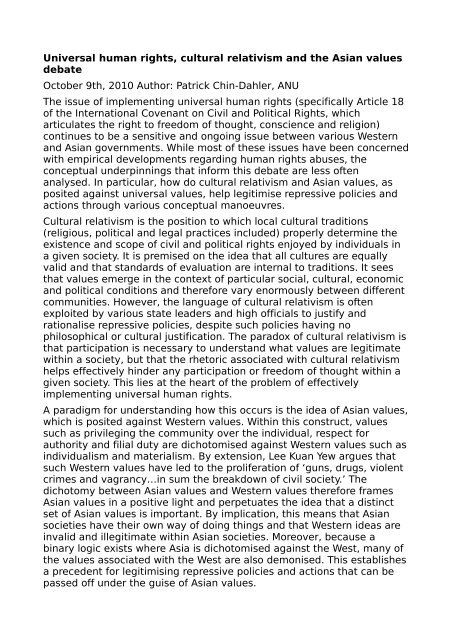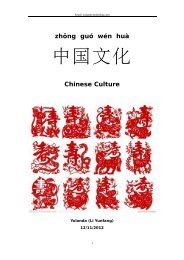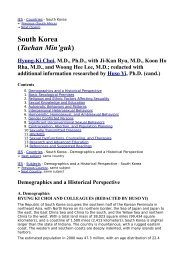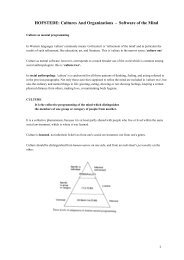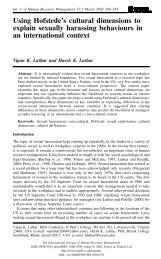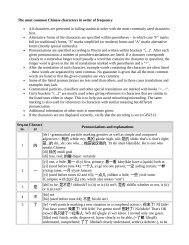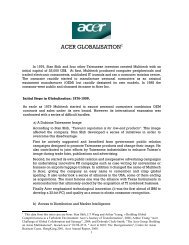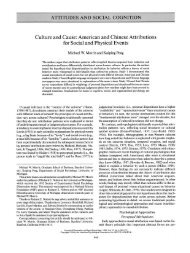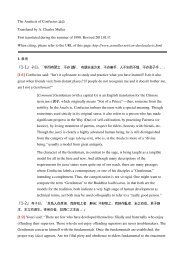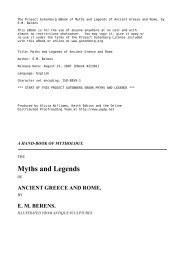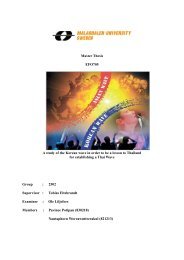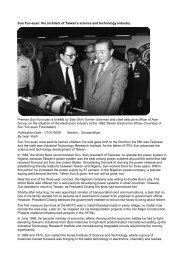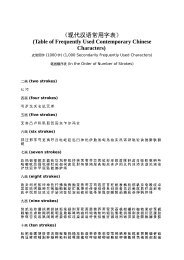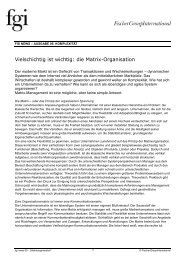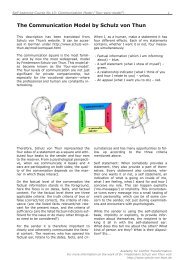Universal human rights, cultural relativism and the Asian values ...
Universal human rights, cultural relativism and the Asian values ...
Universal human rights, cultural relativism and the Asian values ...
Create successful ePaper yourself
Turn your PDF publications into a flip-book with our unique Google optimized e-Paper software.
<strong>Universal</strong> <strong>human</strong> <strong>rights</strong>, <strong>cultural</strong> <strong>relativism</strong> <strong>and</strong> <strong>the</strong> <strong>Asian</strong> <strong>values</strong><br />
debate<br />
October 9th, 2010 Author: Patrick Chin-Dahler, ANU<br />
The issue of implementing universal <strong>human</strong> <strong>rights</strong> (specifically Article 18<br />
of <strong>the</strong> International Covenant on Civil <strong>and</strong> Political Rights, which<br />
articulates <strong>the</strong> right to freedom of thought, conscience <strong>and</strong> religion)<br />
continues to be a sensitive <strong>and</strong> ongoing issue between various Western<br />
<strong>and</strong> <strong>Asian</strong> governments. While most of <strong>the</strong>se issues have been concerned<br />
with empirical developments regarding <strong>human</strong> <strong>rights</strong> abuses, <strong>the</strong><br />
conceptual underpinnings that inform this debate are less often<br />
analysed. In particular, how do <strong>cultural</strong> <strong>relativism</strong> <strong>and</strong> <strong>Asian</strong> <strong>values</strong>, as<br />
posited against universal <strong>values</strong>, help legitimise repressive policies <strong>and</strong><br />
actions through various conceptual manoeuvres.<br />
Cultural <strong>relativism</strong> is <strong>the</strong> position to which local <strong>cultural</strong> traditions<br />
(religious, political <strong>and</strong> legal practices included) properly determine <strong>the</strong><br />
existence <strong>and</strong> scope of civil <strong>and</strong> political <strong>rights</strong> enjoyed by individuals in<br />
a given society. It is premised on <strong>the</strong> idea that all cultures are equally<br />
valid <strong>and</strong> that st<strong>and</strong>ards of evaluation are internal to traditions. It sees<br />
that <strong>values</strong> emerge in <strong>the</strong> context of particular social, <strong>cultural</strong>, economic<br />
<strong>and</strong> political conditions <strong>and</strong> <strong>the</strong>refore vary enormously between different<br />
communities. However, <strong>the</strong> language of <strong>cultural</strong> <strong>relativism</strong> is often<br />
exploited by various state leaders <strong>and</strong> high officials to justify <strong>and</strong><br />
rationalise repressive policies, despite such policies having no<br />
philosophical or <strong>cultural</strong> justification. The paradox of <strong>cultural</strong> <strong>relativism</strong> is<br />
that participation is necessary to underst<strong>and</strong> what <strong>values</strong> are legitimate<br />
within a society, but that <strong>the</strong> rhetoric associated with <strong>cultural</strong> <strong>relativism</strong><br />
helps effectively hinder any participation or freedom of thought within a<br />
given society. This lies at <strong>the</strong> heart of <strong>the</strong> problem of effectively<br />
implementing universal <strong>human</strong> <strong>rights</strong>.<br />
A paradigm for underst<strong>and</strong>ing how this occurs is <strong>the</strong> idea of <strong>Asian</strong> <strong>values</strong>,<br />
which is posited against Western <strong>values</strong>. Within this construct, <strong>values</strong><br />
such as privileging <strong>the</strong> community over <strong>the</strong> individual, respect for<br />
authority <strong>and</strong> filial duty are dichotomised against Western <strong>values</strong> such as<br />
individualism <strong>and</strong> materialism. By extension, Lee Kuan Yew argues that<br />
such Western <strong>values</strong> have led to <strong>the</strong> proliferation of ‘guns, drugs, violent<br />
crimes <strong>and</strong> vagrancy…in sum <strong>the</strong> breakdown of civil society.’ The<br />
dichotomy between <strong>Asian</strong> <strong>values</strong> <strong>and</strong> Western <strong>values</strong> <strong>the</strong>refore frames<br />
<strong>Asian</strong> <strong>values</strong> in a positive light <strong>and</strong> perpetuates <strong>the</strong> idea that a distinct<br />
set of <strong>Asian</strong> <strong>values</strong> is important. By implication, this means that <strong>Asian</strong><br />
societies have <strong>the</strong>ir own way of doing things <strong>and</strong> that Western ideas are<br />
invalid <strong>and</strong> illegitimate within <strong>Asian</strong> societies. Moreover, because a<br />
binary logic exists where Asia is dichotomised against <strong>the</strong> West, many of<br />
<strong>the</strong> <strong>values</strong> associated with <strong>the</strong> West are also demonised. This establishes<br />
a precedent for legitimising repressive policies <strong>and</strong> actions that can be<br />
passed off under <strong>the</strong> guise of <strong>Asian</strong> <strong>values</strong>.
Community <strong>values</strong> are also consistently highlighted as a typical <strong>Asian</strong><br />
value <strong>and</strong> are posited against <strong>the</strong> Western value of individualism.<br />
However, <strong>the</strong>re are ambiguities about <strong>the</strong> definition of community. In<br />
political discourses, one often sees <strong>the</strong> community collapses into <strong>the</strong><br />
state <strong>and</strong> <strong>the</strong> state collapse into <strong>the</strong> regime. When equations are drawn<br />
between <strong>the</strong> community, state <strong>and</strong> <strong>the</strong> regime, criticisms of <strong>the</strong> regime<br />
become crimes against <strong>the</strong> nation-state, <strong>the</strong> community <strong>and</strong> <strong>the</strong> people.<br />
This conceptual manoeuvre allows <strong>the</strong> dismissal of individual <strong>rights</strong> that<br />
conflict with <strong>the</strong> regime’s interests. At <strong>the</strong> same time, this view denies<br />
<strong>the</strong> existence of conflicting interests between <strong>the</strong> state <strong>and</strong> communities<br />
in an <strong>Asian</strong> nation or society. Thus, what begins as an endorsement of<br />
<strong>the</strong> community <strong>and</strong> society in harmony ends in an assertion of <strong>the</strong><br />
supreme status of <strong>the</strong> regime <strong>and</strong> its leaders. Draconian <strong>and</strong> repressive<br />
policies are <strong>the</strong>refore concealed in <strong>the</strong> name of <strong>the</strong> community interest.<br />
The concept of self-Orientalism can also be used as a defence against<br />
implementing universal <strong>human</strong> <strong>rights</strong>. Self-Orientalism can be defined as<br />
<strong>the</strong> uncritical acceptance of a foreign negative description of oneself or<br />
one’s people. By framing <strong>Asian</strong> people <strong>and</strong> societies within this pejorative<br />
light, one can underst<strong>and</strong> Western <strong>values</strong> as a repressive strategy or<br />
elitist notion that considers <strong>values</strong> as inappropriate for <strong>Asian</strong> people at<br />
this point in time. Moreover, self-Orientalism <strong>and</strong> ‘Right side up’<br />
Orientalism are not contradictory ideas, but ra<strong>the</strong>r complementary as<br />
<strong>the</strong>y both present <strong>Asian</strong> <strong>values</strong> as distinct from Western <strong>values</strong>. Whe<strong>the</strong>r<br />
<strong>the</strong>y are framed in a positive or negative light is less important than <strong>the</strong><br />
fact that <strong>the</strong>y serve to distance <strong>Asian</strong> <strong>values</strong> from Western <strong>values</strong>. Once<br />
this distance is created, it legitimises certain <strong>values</strong> based on <strong>the</strong> notion<br />
that <strong>the</strong>y are suited to <strong>Asian</strong> societies.<br />
The language of <strong>cultural</strong> <strong>relativism</strong> <strong>the</strong>refore can construct false<br />
dichotomies that posit Western <strong>and</strong> <strong>Asian</strong> <strong>values</strong> as irreconcilable<br />
opposites. By critically analysing <strong>the</strong> conceptual underpinnings of such<br />
discourses, it is hoped that <strong>the</strong> premise for many policies will be<br />
removed, <strong>and</strong> thus gradually change.<br />
Patrick Chin-Dahler is currently studying a Bachelor of Asia-Pacific<br />
Studies (Honours) at <strong>the</strong> Australian National University.<br />
http://www.eastasiaforum.org/2010/10/09/universal-<strong>human</strong>-<strong>rights</strong><strong>cultural</strong>-<strong>relativism</strong>-<strong>and</strong>-<strong>the</strong>-asian-<strong>values</strong>-debate/


